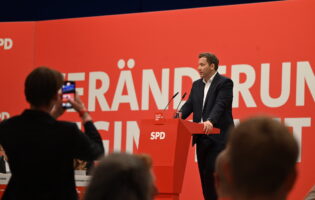Napolitano’s Plan

Alexander Privitera
AGI Non-Resident Senior Fellow
Alexander Privitera a Geoeconomics Non-Resident Senior Fellow at AGI. He is a columnist at BRINK news and professor at Marconi University. He was previously Senior Policy Advisor at the European Banking Federation and was the head of European affairs at Commerzbank AG. He focuses primarily on Germany’s European policies and their impact on relations between the United States and Europe. Previously, Mr. Privitera was the Washington-based correspondent for the leading German news channel, N24. As a journalist, over the past two decades he has been posted to Berlin, Bonn, Brussels, and Rome. Mr. Privitera was born in Rome, Italy, and holds a degree in Political Science (International Relations and Economics) from La Sapienza University in Rome.
At age 87, the President of Italy, Giorgio Napolitano, is getting ready to guide Italian politics out of the deep hole it has sunk into. He will need to gather all his strength in order to succeed. His main task in the coming weeks is to convince the leader of the Partito Democratico (PD) Pierluigi Bersani that the path out of the stalemate does not include a PD led minority government. Given the state of utter shock and frenzy that has gripped Bersani, Napolitano’s task will not be easy. However, his is not a mission impossible.
First and foremost, the old president needs time to allow Italy and the PD to digest the results of these elections. Once the dust settles, Napolitano must hope that cooler heads prevail. Bersani will likely not be one of them. The leader of the PD has decided to push forward with the idea of a minority government, and he will waste valuable time trying to find some arrangement with the Movement Five Stars led by comedian Beppe Grillo. His strategy rests on a few key assumptions:
-Most late Grillo supporters are disgruntled PD voters who will turn their backs on him once they realize that the PD is serious about addressing their grievances and that Grillo is a dangerous man.
-The real enemy continues to be former Prime Minister Silvio Berlusconi. Any form of support for a government endorsed by Berlusconi would play into Grillo’s hands and destroy the PD. As long as Berlusconi stays in the political arena, there will be no agreement with his party.
Against this backdrop, it is clear that the main task of a minority government led by Bersani would be to continue the political campaign as acting prime minister and prepare the ground for a new vote. The task of such a government would be to contain Berlusconi and to deflate the Grillo bubble. It is hard to imagine that such an administration would make any unpopular decisions, such as reforming the labor market or further liberalizing the economy. Italy would instead enter an uncertain phase of permanent campaigning.
Napolitano will probably allow Bersani to try out his strategy, but only in order to pull the plug once it becomes all too evident that the current leader of the PD has reached a dead end. Relations between Napolitano and Bersani have soured considerably over the past several days. The president is looking for stability, not for protracted uncertainty. Bersani has become an obstacle.
Napolitano’s term expires is May and he has demonstrated in the past that he is a thoughtful guardian of the Italian post-war democratic order. He is not about to jeopardize this legacy.
He, as well as most Italians, recognizes that Grillo’s movement is here to stay (at least for the foreseeable future), and that it will take time to restore Italians’ confidence in a political system that is perceived as self-serving and morally corrupt. Once Bersani hits a wall and the PD decides that it is time for him to go, it should become obvious that the only government that can grant some stability is one supported by all the main traditional parties, PD and PDL (and possibly the party of outgoing Prime Minister Mario Monti). Whether such a government is led by a technocrat or a politician is of secondary importance. If support for Grillo grows, it will be because the political establishment demonstrates that it is truly unable to learn from its own mistakes.
No matter what type of government emerges in the coming weeks, it is unlikely to tackle Italy’s underlying economic problems, such as its lack of competitiveness and growth. Any tentative majority for further meaningful structural economic reforms has simply melted away at the ballot box.
In fact, in order to regain control over the political situation and to weaken Grillo, politicians of all stripes will be completely consumed by the need to agree on some institutional changes (such as the controversial electoral law) and the reduction of the so-called costs of politics. Everything else will play a minor role or end up in a holding pattern. Italy’s economic recovery now completely hinges on global, and particularly European, growth. If the latter fails to materialize in the second half of the year or at the beginning of 2014, unemployment will continue to go up and the political situation could deteriorate further.
Italians have created an explosive mix: the political crisis (which is at least twenty years old) is now worsened by economic hardship. Europe is now mainly perceived by many Italians as a punishment for past sins, not as the traditional transnational fix, able to mitigate the adverse effects of bad domestic Italian politics. It will take much more than a stable new government in Rome to put this to rights.









